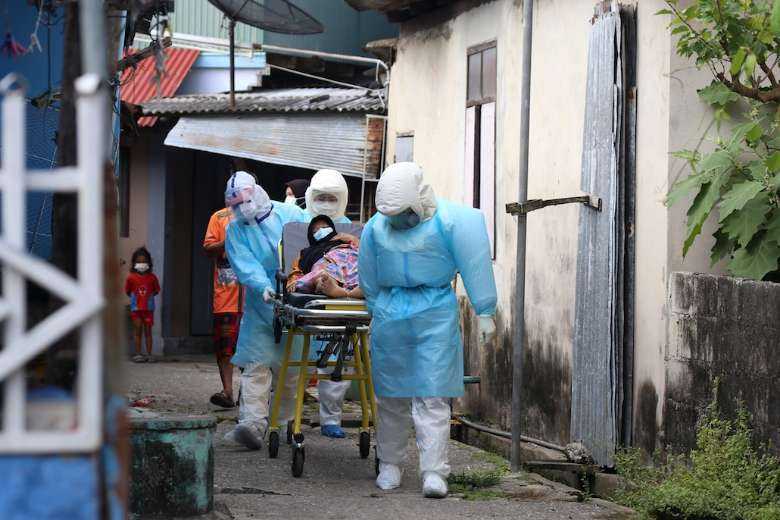
Health workers wheel a patient with Covid-19 symptoms to be taken to hospital from a village in Pattani province on July 19 as Thailand seeks to contain a surge in coronvirus cases. (Photo: AFP)
Millions of Thais are not only facing a devastating health crisis but also the prospect of deepening poverty and financial ruin as the Southeast Asian country battles a raging Covid-19 outbreak.
And they have not only the implacable virus to blame but their own government too.
Thailand’s tourism-dependent economy has been in a state of suspended animation since March last year when the country’s borders were closed to international tourism.
The months-long lockdowns on businesses in Bangkok and other hotspots of the disease have only added to the widespread penury with record unemployment in the country.
Prime Minister Prayut Chan-o-cha, whose government is being faulted for mismanaging the Covid-19 crisis, has said the country would reopen its borders by October, come what may.
However, an unrelenting surge in new daily infections, which officially reached a record 13,002 on July 21, is making the prospect of reopening borders seem more and more remote.
The economic shock associated with Covid-19 has adversely affected employment, incomes and poverty in Thailand
The loss of international tourism has affected millions of locals who depended on jobs catering to foreign visitors, of whom nearly 40 million arrived in 2019, the year before the pandemic.
The shortage of effective government schemes to help those rendered jobless as well as other economically disadvantaged citizens during the ongoing third wave has only added to the misery of Thais.
Judging from anecdotal evidence, the rate of homelessness has increased dramatically around Bangkok and other urban areas along with abject poverty in rural areas.
“The economic shock associated with Covid-19 has adversely affected employment, incomes and poverty in Thailand,” the World Bank said in a statement released on July 20.
“Going forward, continued assistance to the poor and vulnerable, including informal workers, will be necessary as Covid-19 continues to impact Thailand’s economy.”
The question is whether the government, which is comprised of an alliance of ultraconservatives and military generals who seized power in a coup seven years ago, has the will and the good grace to devote more financial resources to help the poorest citizens.
The Thai government is facing budgetary constraints in the face of declining revenues but still has the resources to provide meaningful assistance to the poor, according to Birgit Hansl, the World Bank’s country manager for Thailand.
“Thailand’s fiscal space is still sufficient to allow supporting measures to protect the poor and most in need in the months to come,” Hansl said.
To date, Thailand has recorded more than 439,000 cases and 3,610 deaths, most of them since April when the third outbreak began, largely fueled by the highly infectious Delta variant, first identified in India and now present in countries across the region.
The nationwide mass vaccination project, launched last month, is progressing at a sluggish pace owing to chronic shortages of vaccine supplies.
With the government’s mistakes in containing the disease and management of vaccinations, Thailand has entered a health and economic crisis once again
Most Thais lay the blame on Prayut’s administration, and rightly so.
“With the government’s mistakes in containing the disease and management of vaccinations, Thailand has entered a health and economic crisis once again, to the extent that it has lost the opportunity for a speedy recovery and a competitive edge on the global stage,” a new report by the Thailand Development Research Institute says.
A pilot project allowing select groups of fully vaccinated tourists on the southern resort island of Phuket without the need for quarantine has got off to a rocky start. Several new arrivals were forced to stay in quarantine facilities after testing positive for Covid-19.
Online testimonials of foreign visitors confirm the heavy-handed treatment meted out by local officials, turning their carefree holiday into solitary confinement in hotels. This may deter prospective tourists to Phuket, at least for the time being.
Meanwhile, it is ordinary Thais who remain at the receiving end of the government’s continued mismanagement of the crisis.
“[These Thais] feel deserted and betrayed by their own government. They feel they have to fight to stay alive and afloat by themselves,” Atiya Achakulwisut, a prominent political commentator, noted in an op-ed published in the Bangkok Post on July 20.
They feel the government not only does not help but almost goes out of its way to add more of a burden to their hardship, she said.
The views expressed in this article are those of the author and do not necessarily reflect the official editorial position of UCA News.


